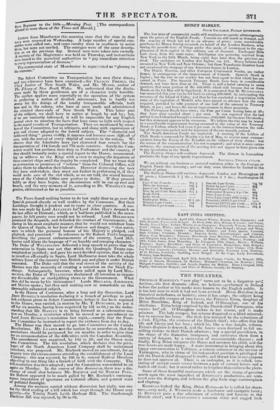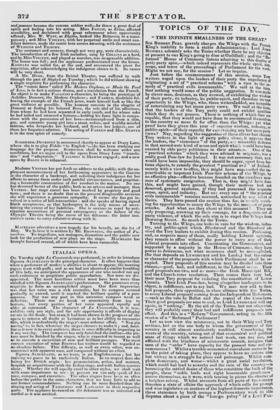THE THEATRES.
STIERIDAN KNOWLES'S "new play" turns out to be a forgotten pre: duction—his first dramatic effort, we believe—performed in Ireland before the author or his works were known to the English public. It is too late now to wish it had not been revived. Brian Boroilone is an historical melodrama, or burletta, since it has songs; the subject being the hairbreadth escapes of two lovers, the Princess Ernie, daughter of Brian Boroibme, King of Ireland, and O'Donoghue, one of his chieftains. Ed na being surprised by the Danish chief Tormagnus, who carries her rrir. O'Doiloghne rushes to her rescue, and is made prisoner. The lady escapes, but returns disguised as a blind minstrel- boy to succour her lover. She finds him tempted by the seductions of a rival, Mitt's, the mistress of the Danish thief; who offers him his life and liberty and her love ; which be, like a true knight, refuses. Erina's disguise is detected, and the lovers seem destined to fall un- willing victims to their Danish admirers ; but a special providence, in the shape of the dramatist, interposes, and extricates them from a variety of dangers, by a succession of unaccountable chances; and finally, King Brian conquers the Danes and recovers his child, and the true lovers are made happy. A nmin instrument in bringing about this happy consummation is Voltimer, a veteran volunteer in the service of Tonnagnus, who in virtue of his independent position is privileged to tell the Danish chief disagree:111e truths, and thwart him in any purpose he does not approve of. There is an underplot, as it is called, con- sisting of several comic scenes between a pair of servant lovers and a foolish old rival; but it served rather to lengthen than enliven the piece.
Some of those beautiful sentiments which set the stamp of genuine worth upon the most imperfect of KNOWLES'S productions, are scat- tered over the dialogue, and redeem the play from stage commonplace and claptrap.
KNOWLES looked the King, Brian Barou—as he is called for short- ness—very well ; J. WEBSTI:R made a haudsome and energetic lover ; G. BENNETT gave a due admixture of subtlety and ferocity to the Danish chief; and VANDEN1101-T'S sonorous voice and rugged look and manner became the veteran soldier well—be threw a great deal of spirit and feeling into his acting. Miss FAUCIT, as Erina, affected sensibility, and declaimed with great vehemence when oppottunity offered; Mrs. W. WEST, as Elgitha, looked like Britannia in a trans- parency; and Miss VINCENT, With her perpetual smile and smart con- fident manner, made the comic love scenes amusing, with the assistance Of WEBSTER and TILBURY.
The costumes and scenery, though not very gay, were characteristic. The introduction of a few Irish melodies, sung by COLLINS as a bard, and by Miss VINCENT, and played as marches, was an agreeable addition. The house was full ; and the applauses predominated over the hisses. _Ks:diet-es was called for, at the end, and announced the piece for repetition, after acknowledging the indulgence shown to it. Its career will be very short.
A Mr. HYDE, from the Bristol Theatre, was suffered to walk through the part of Shekel/ on Tuesday ; which he did without showing a single requisite for performing the character. The "comic farce" called The Modern Orpheus, or Music the Food of Love, is in fact a serious drama, and a translation from the French. Its object is to make PAGANINI a character, be being the prototype of Achilles Dumont, the Modern Orpheus ; and FARREN, doubtless fol- lowing the example of the French actor, made himself look as like the great violinist as possible. The humour consists in the chagrin of Dumont at finding his beloved Rose, the sole idol of his affections, from whom he had been separated in early youth, and for whose sake he had toiled and amassed a fortune—holding his fame light in compa- rison with the possession of her love—metamorphosed from a slim, gay, and romantic young girl into a stout, sedate, and worldly-minded matron, who henpecks her husband, and fleeces her lodgers, one of them her forgotten admirer. The acting of FARREN and Mrs. GLOVER is in the true spirit of comedy.



























 Previous page
Previous page